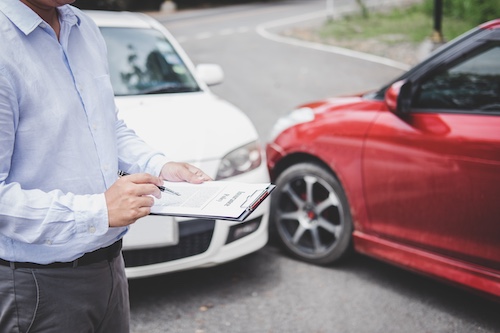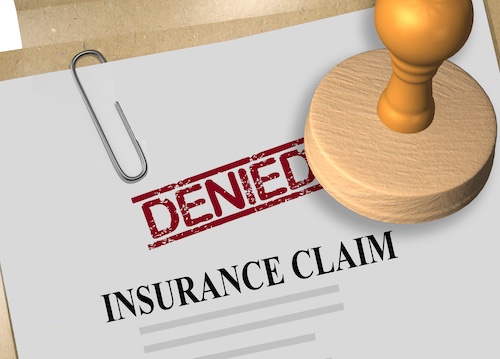Car Accident Claim Denied in Georgia: What You Need to Know
At Wade Law Office, we have served Fayetteville and the surrounding communities for decades with a focus on personal injury and car accident cases. Our team combines more than 70 years of trial experience, giving us the knowledge and skill to take on insurance companies and protect the rights of car accident victims. We are committed to providing personal attention, clear communication, and strong legal representation for every client.
Having a car accident claim denied can feel like a second blow after the crash itself. Medical expenses, lost wages, and vehicle repairs can pile up while the insurance company refuses to pay. In Georgia, denied claims are common because insurance providers often dispute liability, question medical treatment, or rely on policy technicalities.
For car accident victims, knowing why insurance companies deny claims and what steps to take next is critical. With the help of an experienced Fayetteville car accident lawyer, you can challenge the denial, protect your rights, and pursue the compensation you deserve.
Why Insurance Companies Deny Car Accident Claims
Insurance companies often deny car accident claims to limit their financial responsibility. Understanding their common reasons helps car accident victims prepare a stronger response.
Disputes Over Liability Coverage
A car insurance company may deny claims if they argue their policyholder was not the at fault driver. Insurance adjusters often question who caused the car crash, especially if police reports or witness statements are unclear. Without clear evidence, the insurance provider may refuse to cover medical expenses, lost wages, or property damage.
Insufficient Medical Records or Delayed Treatment
Car accident victims sometimes face a denied car insurance claim if their medical records do not support the injuries claimed. Insurance companies may argue that medical treatment was unnecessary or unrelated to the accident. Delays in seeing a medical professional can also lead an insurance company to dispute whether the accident caused the injuries.
Claiming Coverage Limits Were Reached
An auto insurance company may accept liability but still refuse to pay if coverage limits are exhausted. Georgia drivers must meet state minimum insurance coverage requirements under O.C.G.A. § 33-7-11, but these limits may not cover severe injuries or extensive medical bills. When this occurs, accident victims may need to file a personal injury claim against the at fault party to seek maximum compensation.
Policy Exclusions and Technicalities
Insurance companies deny claims when they rely on technical details in the auto insurance policy. This may include exclusions for drivers without a valid driver’s license, unauthorized use of a vehicle, or violations of policy terms. Even minor errors in the claims process can give the insurance company grounds to reject a car insurance claim.
Reviewing the Claim Denial Letter
A claim denial letter is the insurance company’s official explanation for rejecting a car accident claim, and it is the first step in deciding how to respond.
Identifying the Reason for Denial
The denial letter will state why the car insurance company denied coverage. Common reasons include lack of evidence, disputes about the at fault driver, or missed deadlines in the claims process. Understanding the insurance company’s decision is essential before taking further action.
Comparing the Denial to Your Policy
The denial letter often cites specific terms from your auto insurance policy. Reviewing these terms helps determine if the insurance provider applied them correctly. Comparing the denial with your coverage limits and liability coverage can reveal whether the refusal was justified or if the car insurance company misapplied its own rules.
Deadlines for Response or Appeal
Most denial letters include a timeline for responding or filing an appeal. Missing this deadline can make it harder for car accident victims to recover medical expenses, lost wages, or other damages. Acting quickly ensures the insurance company cannot use timing as another reason to reject the accident claim.
When to Seek Legal Help
Because denial letters often use complex language, many accident victims turn to a Fayetteville car accident attorney for guidance. An experienced car accident lawyer can review the insurance company’s explanation, compare it with policy terms, and build a strategy to challenge the denial.
Gather and Strengthen Your Evidence
Stronger evidence improves the chances of overturning a denied car accident claim and proving the insurance company wrong.
Medical Bills and Medical Reports
Accident victims should collect all medical records, including emergency room visits, follow-up appointments, and physical therapy. Clear documentation links the car crash to the injuries and supports the amount of medical expenses claimed. Insurance adjusters often deny claims when medical treatment is incomplete or missing.
Police Reports and Accident Scene Evidence
Police reports provide an objective record of the car accident. They often include details about the at fault driver, witness statements, and traffic violations. Accident scene photos showing vehicle damage and road conditions further strengthen the accident claim. These details help prove negligence when the insurance company denies liability coverage.
Witness Statements and Independent Evidence
Independent witnesses can confirm how the car crash occurred. Written or recorded witness statements are valuable when the other driver’s insurance company disputes fault. Inconsistent or missing witness accounts often give insurance companies an excuse to deny claims.
Proving Negligence Under Georgia Law
Under O.C.G.A. § 51-1-6, car accident victims in Georgia have the right to seek compensation if another driver’s negligence caused their injuries. Strong evidence is critical to proving negligence and holding the at fault party responsible for medical expenses, lost wages, and other damages in a personal injury claim.
Filing an Internal Appeal with the Insurance Company
An internal appeal gives car accident victims the chance to challenge the insurance company’s decision before taking legal action.
Understanding the Appeals Process
Most auto insurance companies allow policyholders to dispute a claim denial through an internal review. The appeal must usually be filed in writing and supported with evidence. The insurance adjuster or another representative will review the new submission and decide whether to overturn the denial.
Submitting Additional Evidence
A strong appeal includes updated medical records, corrected police reports, or new witness statements. Accident victims can also submit proof of ongoing medical treatment or documentation of lost wages. Supplying this evidence helps demonstrate that the denied car insurance claim was valid.
Following Strict Deadlines
Insurance companies often impose short deadlines for appeals. Missing these deadlines may cause the denied claim to become final. Filing on time protects the right to continue pursuing medical expenses, lost wages, and other damages through the claims process.
Legal Guidance During the Appeal
A Fayetteville car accident attorney can prepare an appeal that addresses the insurance company’s reasoning directly. An experienced car accident lawyer understands how insurers evaluate evidence and can increase the chances of reversing a claim denial.
When the At-Fault Driver’s Insurance Company Denies Coverage
A denial from the at fault driver’s insurance company can leave accident victims facing unpaid medical bills and property damage, but there are still options to recover compensation.
Common Reasons for Denial
The other driver’s insurance company may deny coverage by disputing fault, claiming insufficient evidence, or arguing that your injuries were not caused by the accident. Insurance adjusters often point to gaps in medical treatment or conflicting police reports to avoid paying a car accident claim.
Turning to Your Own Auto Insurance Policy
If the at fault party’s insurance provider denies coverage, victims may rely on their own auto insurance policy. Personal injury protection (PIP) or medical payments coverage can help cover medical expenses. Uninsured or underinsured motorist coverage, required under Georgia law, may also apply if the other driver’s liability coverage is unavailable or insufficient.
Proving Fault with Strong Evidence
When the other driver’s insurance denies responsibility, additional evidence can make the difference. Medical records, witness statements, and accident scene photos help prove negligence. A Fayetteville car accident lawyer can use this evidence to challenge the insurance company’s decision and pursue maximum compensation.
Escalating the Claim
If coverage is still denied, accident victims may need to file a personal injury claim against the at fault driver directly. This step allows recovery for medical expenses, lost wages, and pain and suffering beyond the limits of the car insurance claim process.
Legal Remedies if Your Claim is Still Denied
When an insurance company continues to deny a car accident claim, legal remedies become the next step to seek compensation.
Filing a Personal Injury Claim
Car accident victims may file a personal injury claim against the at fault party when insurance coverage is denied. This allows recovery for medical expenses, lost wages, and pain and suffering. Under O.C.G.A. § 9-3-33, Georgia law gives accident victims two years from the date of the accident to file a personal injury case.
Holding the Insurance Company Accountable
If the insurance company denied the claim in bad faith, it may be held liable under O.C.G.A. § 33-4-6. This statute allows victims to seek penalties and attorney’s fees if the insurer refused to pay without reasonable cause. A Fayetteville car accident attorney can determine if the denial qualifies as bad faith.
Proving Negligence in Court
To win compensation in a personal injury case, victims must prove the at fault driver caused the accident through negligence. Evidence such as police reports, medical records, and witness statements becomes critical. Strong evidence can counter the insurance company’s arguments and show the extent of serious injuries.
Maximizing Compensation Through Legal Action
Legal remedies provide a path to recover damages that exceed insurance policy limits. This can include future medical treatment, reduced earning capacity, and long-term care for severe injuries. Working with an experienced car accident lawyer ensures that accident victims pursue maximum compensation.
How a Fayetteville Car Accident Lawyer Can Help
At Wade Law Office, we support car accident victims when insurance companies deny their claims.
Investigating the Case and Gathering Evidence
We gather police reports, medical records, and accident scene photos. We talk to witnesses. We may use accident reconstruction experts to prove fault. Then we present clear evidence of negligence to fight denied car accident claims.
Dealing with Insurance Providers
We handle all communication with insurance companies. We submit strong evidence for medical bills, lost wages, and vehicle damage. We oppose low settlement offers. We push for fair compensation when claims are denied.
Using Georgia Law to Your Advantage
We know Georgia statutes extensively. We act fast to meet deadlines. We ensure denied claims do not become final due to missed timelines.
Going to Court If Needed
If the insurance company still denies your claim, we file a personal injury lawsuit. We handle depositions, expert testimony, motions, and trial. We fight for full compensation, including medical expenses, lost wages, and pain and suffering.
Why Wade Law Office Stands Out
We bring over 70 years of trial experience to each case. We offer a free case review and we work on a no-fee-unless-we-win basis. We are available 24/7 in Fayetteville. We treat clients with care and personal attention, not like case numbers.
Get Help Fighting a Denied Car Accident Claim!
If your car accident claim was denied, do not give up your right to compensation. Our team at Wade Law Office has the experience and resources to challenge insurance companies and hold the at fault driver accountable. We fight for maximum recovery of medical expenses, lost wages, and other damages.
Contact us at 770-282-1188 for a free claim review today!






